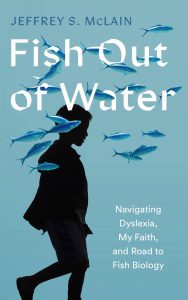
Dyslexia is not a disorder but a neurodivergent gift. How is that for an eye-catching title? Dyslexia, a term that has been deeply misunderstood and stigmatized for decades, affects millions of individuals worldwide. Often oversimplified as a mere “reading disability,” dyslexia is categorized as a complex disability that can manifest in a myriad of ways. It’s time to shed light on this multifaceted condition and challenge its prevailing misconceptions.
In my memoir Fish Out of Water: Navigating Dyslexia, My Faith, and Road to Fish Biology, I wrote about my childhood struggle with dyslexia and how I eventually climbed out of the abyss of the disorder. I scratched the surface of the neuro-oddities of dyslexia in my book, mostly focusing on how I dealt with the difficulty. I also offer ways one can overcome the disability. Be sure to grab your discounted copy at IngramSpark or on Amazon or other online retailers.
While society categorizes dyslexia as a disability, I continue to claim that dyslexia is not a disorder. Dyslexia is not a lack of intelligence or a reflection of laziness. It is a neurological difference that affects how the brain processes and decodes language. Individuals with dyslexia may struggle with reading, spelling, and writing, but their cognitive abilities extend far beyond these narrow domains. Check out my author website and dyslexia page as well for more information about how this disability affects people.
At its core, dyslexia impacts the acquisition and processing of language-based skills. However, it is crucial to understand that this disability does not define the individual’s overall intellectual potential or capabilities.
The Neurodevelopmental Roots of Dyslexia
Dyslexia is classified as a neurodevelopmental disorder, meaning it arises from the intricate interplay between genetic and environmental factors that shape brain development. This neurological condition is not a result of poor teaching, lack of exposure to literacy, or any other external factor. Instead, it is an inherent part of an individual’s neurological wiring, influencing how their brain processes and interprets language-based information.
The neurodevelopmental nature of dyslexia has been extensively studied and validated through various neuroimaging techniques. Research has shown that individuals with dyslexia exhibit distinct patterns of brain activity and structural differences, particularly in regions responsible for language processing and phonological awareness.
Language Difficulty: The Importance of Testing
While dyslexia is often associated with difficulties in reading and writing, its manifestations can vary greatly from person to person. Some individuals may struggle primarily with decoding words, while others may excel in reading but face challenges with spelling or writing. This diverse range of symptoms underscores the importance of comprehensive testing and evaluation.
Determine Testing

Attending middle school in Lafayette, approximately three miles from home, provided various commuting options. Buses, carpools, bikes, and skateboards were all in play. Engaging with diverse teachers in different subjects daily marked my transition to a larger academic pond. We were getting grades now, and everyone would share how they were doing. My friend would proudly explain, “That was an easy test; I got an A.”
This reminded me I was limited academically in some manner. That test that he just got an A on? I studied for hours and got a D. I became very confused by the grades I received on multiple-choice tests. I appeared to perform far better with essay responses and in math. My grades didn’t seem to match my study efforts. I experienced growing frustration and worry as test anxiety began to affect me. Why was I studying for hours every night only to fail a test? Why all the effort for a C or a D in the class?
Jeffrey McLain, Fish Out of Water.
Many students face difficulties in achieving good grades due to the learning system in schools not being designed for dyslexics. Students who haven’t been diagnosed with dyslexia may struggle greatly, and the consequences of not having a diagnosis can affect their future in many ways.
Determine testing is crucial in identifying dyslexia and understanding an individual’s specific strengths and weaknesses. This process typically involves a battery of assessments administered by qualified professionals, such as educational psychologists or speech-language pathologists. These assessments evaluate various aspects of language processing, including phonological awareness, rapid naming, working memory, and reading comprehension.
By undergoing testing, individuals can receive an accurate diagnosis and gain valuable insights into their unique learning profile. This information is instrumental in developing personalized interventions, accommodations, and strategies to support their academic and professional endeavors.
Dyslexia is not a Disorder
While dyslexia undoubtedly presents challenges in certain areas, it is essential to recognize and celebrate the strengths and unique perspectives that often accompany this condition. Individuals with dyslexia frequently excel in areas such as problem-solving, creativity, spatial reasoning, and big-picture thinking. I continue to maintain that dyslexia is not a disorder.
Many successful entrepreneurs, artists, inventors, and leaders have dyslexia, proving that this condition does not inherently limit one’s potential for success. By embracing and nurturing their strengths, individuals with dyslexia can forge their own paths and contribute invaluable insights to various fields.
Despite the prevalence of dyslexia, societal stigmas and misconceptions continue to persist, often hindering individuals from seeking the support they need. It is crucial to challenge these harmful narratives and promote a more inclusive and understanding environment.
Dyslexia is a different way of processing information that comes with its own set of strengths and challenges. By acknowledging and embracing neurodiversity, we can create an environment where individuals with dyslexia can thrive and reach their full potential.
Moving forward, it is imperative to prioritize early intervention, provide appropriate accommodations, and foster a culture of inclusivity within educational and professional settings. By doing so, we can empower individuals with dyslexia to overcome obstacles and unlock their true potential.
Dyslexia is a complex and multifaceted condition that defies simplistic definitions or stereotypes. It is a disorder that manifests as a learning disability, but it is also a testament to the remarkable diversity of the human mind.
By understanding dyslexia through a holistic lens, embracing its strengths, and providing the necessary support and accommodations, we can create an environment where individuals with dyslexia can flourish and contribute their unique perspectives to society.
Through continued research, awareness, and inclusive practices, we can break down the barriers and stigmas surrounding dyslexia, empowering individuals to excel in their chosen paths and reach their full potential.
For a deeper dive into dyslexia, I recommend starting your research by looking at the World Dyslexia Association. If you are struggling with dyslexia and would like some suggestions, check out my gardening website. It reflects one of my hobbies, which can be a useful tool in managing dyslexia. (people with dyslexia often express their abilities through hobbies). See my books Backyard Big: Growing Atlantic Giant Pumpkins in Your Backyard and Backyard Big: Growing Food in Your Backyard. I also have a blog with many gardening topics. I would love to hear from you!
